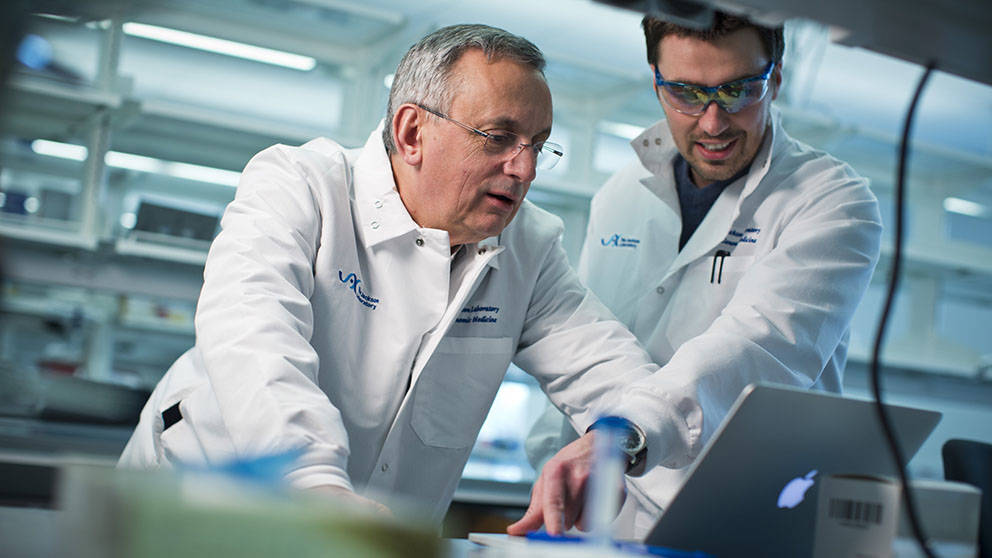We know that people have less robust immune responses as they age, and the elderly are more prone to infection and have lower protection rates from vaccines. There are also immune differences between the sexes—for example, adult women have higher susceptibility to autoimmune disease. A team led by Duygu Ucar and Jacques Banchereau analyzed immune cells from a large cohort of healthy people spanning the adult life span (22-93), carefully matched between women and men, to investigate age- and sex-related immune differences. They found significant differences in immune gene regulation and function between the sexes that increased with age. After age 65, men displayed higher innate and pro-inflammatory immune activity and lower adaptive immune function, indicating less robust infection response.

JAX computational scientist Duygu Ucar bridges the worlds of biology and computer science to unlock the secrets of aging and age-related disease. JAX photo by Tiffany Laufer.
Recent studies have provided some interesting facts about how human immune function changes over time and varies from person to person. For example, older people have less robust immune responses, which makes them more prone to infections and reduces their responsiveness to vaccination. We also know that there are differences in immune function and response between women and men, perhaps most clearly illustrated by women’s higher susceptibility to inflammatory and autoimmune diseases. Nonetheless, researchers are only beginning to investigate how men’s and women’s immune systems compare with each other at different ages and what molecular mechanisms underlie the differences between them.
Differences between men and women
Building upon their previous work exploring differences in the immune systems of older versus younger people, a team led by Jackson Laboratory (JAX) Duygu Ucar, Ph.D.Develops computational models using genome datasets to study gene regulation and identify hypotheses for genomic medicine.Associate Professor Duygu Ucar, Ph.D., and profiled the immune cells of 172 healthy adults aged 22-93 years old by carefully matching male and female participants in terms of age, BMI and other clinical parameters. They uncovered significant differences between blood-derived immune cells of men and women, and they present their findings in “Sexual-dimorphism in human system aging,” published in Nature Communications. Their study shows that while both sexes experience immune changes with age, these age-related changes differ between sexes regarding which cell types are activated or inactivated, the rate of activation/inactivation, as well as the timing of the changes.
The researchers isolated peripheral blood mononuclear cells (PBMCs) from 91 women and 81 men. PBMCs include different immune cells, including T cells, B cells and monocytes. The men and women were carefully age-matched across the adult lifespan, with 54 young (<41 years old), 59 middle-aged (41-64) and 59 older (65+) subjects. Researchers detected changes in how gene expression programs are regulated by generating transcriptomic (mRNA) and epigenomic maps. Epigenomic changes involve chemical compounds that affect gene expression and can be added or removed from the DNA.
Previously, the team had found that chromatin accessibility patterns of immune cells differ between young and old subjects. DNA is tightly wound and highly organized in nuclei, so “closed” chromatin curtails gene expression, while “open” chromatin indicates that the transcription machinery can access the DNA to produce mRNA. The changes indicated decreases in adaptive immune function, in which the immune system responds to foreign objects, such as microbial pathogens. In addition, there were gains in chromatin accessibility for innate immunity and pro-inflammatory processes, providing a possible reason for increasing chronic inflammation with age.
How does sex affect the immune system?
In the new study, they uncovered important sex differences in immune system aging. A particularly striking finding involved B cells, important players in the adaptive immune response pathway that secrete antibodies against pathogens. The researchers found relatively little change in them with aging in the female subjects, but in older men there was a significant loss of chromatin accessibility, indicating a loss of function. They also showed that changes in men are stronger than the changes in women despite the clinical similarity of the two cohorts.
By studying patterns across adult lifespan, the researchers uncovered two time points that are associated with rapid epigenomic changes. The first was detected in the late 30s to early 40s in both sexes. The second, however, has differences in both timing and magnitude between older men and women. In the male subjects, it took place between ages 62-64, while in females the changes were less profound and occurred between ages 66-71. Intriguingly, this five-year delay in the timing of the changes mirrors the lifespan differences between sexes.
Overall, the biggest sex-differences were observed after age 65, with women having more activity associated with adaptive (B and T) immune cells, and the men with innate (including inflammatory) immune cells, which might explain why men are more prone to infectious diseases and women are more prone to auto-immune diseases. The study suggests that sex differences in human immune system aging have important implications for clinical care, including what therapies should be administered—and when—for age-related diseases. Data from the study is available for browsing and querying through a web application (https://immune-aging.jax.org/).
 Jacques Banchereau. Photo by Dominick Reuter.
Jacques Banchereau. Photo by Dominick Reuter.